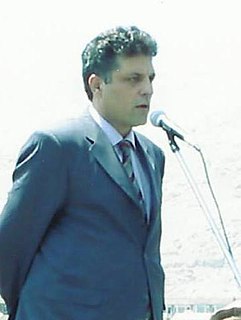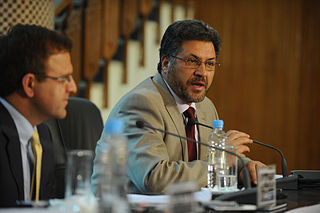Related Research Articles

Gul Agha Sherzai, also known as Mohammad Shafiq, is a politician in Afghanistan. He is the former governor of Nangarhar province in eastern Afghanistan. He previously served as Governor of Kandahar province, in the early 1990s and from 2001 until 2003. In October 2013, Sherzai resigned from his post as governor and formally announced himself as a candidate for Afghanistan's 2014 Presidential Election, and served as the minister of border and tribal affairs until the Taliban victory in 2021.

Mohammad Ashraf Ghani Ahmadzai is an Afghan politician, academic, and economist who served as the fifth president of Afghanistan and the second and final president of the Islamic Republic of Afghanistan from September 2014 until August 2021, when his government was overthrown by the Taliban.
Ghulam Ishaq Khan, was a Pakistani bureaucrat who served as the seventh president of Pakistan, elected in 1988 until his resignation in 1993. He was the founder of his namesake Ghulam Ishaq Khan Institute.

Presidential elections were held in Afghanistan on October 9, 2004. Hamid Karzai won the elections with 55.4% of the vote and three times more votes than any other candidate. Twelve candidates received less than 1% of the vote. It is estimated that more than three-quarters of Afghanistan's nearly 12 million registered voters cast ballots. The elections were overseen by the Joint Electoral Management Body, chaired by Zakim Shah and vice-chaired by Ray Kennedy, an American working for the United Nations.
This article gives information on elections in Afghanistan.

Abdul Latīf Pedrām is a politician and a Member of Parliament in Afghanistan. He emerged as a controversial figure in the press and political circles for campaigning for women's personal rights, a taboo subject in Afghanistan's culture. Currently, he is the leader of the National Congress Party of Afghanistan and was one of the nine representatives of Badakhshan province in the lower house of parliament. He is on the run since August 2021 following Taliban’s takeover of Kabul. His home town fell prior to Kabul.

Ramazan Bashardost was former planning minister in Afghanistan and a current member of the National Assembly of Afghanistan. He was an independent candidate in the 2009 Afghan presidential election.

Presidential elections were held in Afghanistan on 20 August 2009. The election resulted in victory for incumbent Hamid Karzai, who won 49.67% of the vote, while his main rival Abdullah Abdullah finished second with 30.59% of the vote.

Abdullah Abdullah is an Afghan politician who led the High Council for National Reconciliation (HCNR), which was established to facilitate peace talks between the Islamic Republic of Afghanistan and the Taliban insurgents from May 2020 until August 2021, when the Afghan government was overthrown by the Taliban. Abdullah served as the Chief Executive of Afghanistan from September 2014 to March 2020, and as Minister of Foreign Affairs from December 2001 to April 2005. Prior to that, he was a senior member of the Northern Alliance, working as an adviser to Ahmad Shah Massoud. He worked as an ophthalmologist and medical doctor in the 1980s.

Ghulam Farooq Wardak is a politician in Afghanistan, formerly serving as the Minister of Education. He was appointed to that position by Afghan President Hamid Karzai on October 11, 2008.
The 2009 NATO Afghanistan headquarters bombing occurred on August 15, 2009, when a Taliban suicide bomber detonated himself outside the NATO headquarters in Kabul, Afghanistan. The bomber killed at least seven people and injured 91.
Frozan Fana was a candidate in the 2009 Afghan presidential election. Her running mate was Mohammad Nasim Darmand. She had never held political office before. However, she is the widow of Abdul Rahman, the assassinated Afghan Aviation Minister.
Ghulam Muhammad Rigi was a candidate in Afghanistan's 2009 Presidential elections. In an interview with Ferozan Rahmani of the Pajhwok Afghan News he stated that all the planks in his platform were based on Islamic law.

Sarwar Ahmedzai is a citizen of Afghanistan who was a presidential candidate in 2009 and 2014. Currently he is serving as an adviser to the President Ashraf Ghani.
Ghulam Faruq is a Muslim male given name. It may refer to:

Presidential elections were held in Afghanistan on 5 April 2014, with a second round held on 14 June. Incumbent President Hamid Karzai was not eligible to run due to term limits. The registration period for presidential nominations was open from 16 September 2013 until 6 October 2013. A total of 27 candidates were confirmed to be running for office. However, on 22 October Afghanistan's Independent Election Commission disqualified 16 of the candidates, leaving only 11 in the race. By April 2014 three candidates gave up the race and decided to support some of the eight remaining candidates. Opinion polls showed Abdullah Abdullah and Ashraf Ghani as the front-runners and indeed the results of the first round of the election had Abdullah in the lead and Ghani behind him. The second set of results came after the run-off on 14 June, two months after the first round. Preliminary results were expected on 2 July and the final result on 22 July. However, widespread accusations of fraud delayed these results. As a result, John Kerry, then United States Secretary of State, mediated the negotiations between the two final candidates, Ghani and Abdullah. After a series of negotiations and talks between Ghani, Abdullah and Kerry, the two candidates agreed to sign an Agreement to form a National Unity Government based on 50–50 power sharing. As a result of that political agreement, a separate position was created for Abdullah as Chief Executive. The National Unity Government's term ran out after the next Afghan presidential election was held in September 2019.
Shuja ul-Mulk Jalala, also known as Ghulam Rasul, is a politician in Afghanistan. He is the governor of Kunar Province, appointed by President Hamid Karzai on July 15, 2013 after a suggestion by the Independent Directorate of Local Governance (IDLG).
A suicide car bomb exploded at a security checkpoint outside a police station in the Afghanistan capital, Kabul, on 7 August 2019. The explosion occurred in the early morning, in a predominantly Shia neighbourhood in western Kabul. At least 14 people were killed and 145 injured, mostly civilians. The Taliban claimed responsibility for the attack, citing that one of their suicide bombers attacked "a recruitment centre". The attack occurred as ongoing negotiations between the Taliban and the United States were being conducted.

The Islamic Republic of Afghanistan was a presidential republic that ruled Afghanistan from 2004 to 2021. The state was established to replace the Afghan interim (2001–2002) and transitional (2002–2004) administrations, which were formed after the 2001 United States invasion of Afghanistan that had toppled the limitedly-recognized Taliban-ruled Islamic Emirate of Afghanistan. However, on 15 August 2021, the country was recaptured by the Taliban, which marked the end of the 2001–2021 war, the longest war in US history. This led to the overthrowing of the Islamic Republic under President Ashraf Ghani and reinstating the Islamic Emirate under the control of the Taliban. The US–Taliban deal, signed on 29 February 2020 in Qatar, was one of the critical events that caused the collapse of the Afghan National Security Forces (ANSF). Following the deal, the US dramatically reduced the number of air attacks and deprived the ANSF of a critical edge in fighting the Taliban insurgency, leading to the Taliban takeover of Kabul. Soon after, former first vice president Amrullah Saleh declared himself the caretaker president of Afghanistan and announced the republican resistance against the Taliban.
References
- ↑ Mohammad Karim (1 September 2006). "Ghulam Farooq Nijrabi: Nijrabi Aims to Build Bridges". www.iwpr.net. Retrieved 2010-06-10.[ dead link ]
- 1 2 "Preliminary Result of Afghanistan Presidential Contest". www.sabawoon.com. 2009-08-20. Archived from the original on 2009-08-03.